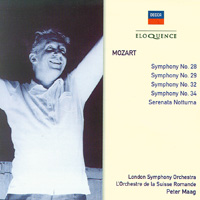 |
| October 1, 2006 Peter Maag's Mozart
That strong impression was reinforced a few months later when Maag and the OSR gave us the Symphonies Nos. 28 and 34, both in C major, and not long after that the "Posthorn" Serenade. Before much longer he began recording in London, with the New Symphony Orchestra in an even less familiar Mozart Serenade, the grand No.4 in D, K. 203, and then a pair of piano concertos (Nos. 13 and 20) with Julius Katchen. When stereo arrived Maag recorded some Rossini overtures and the ballets La Source and Les Sylphides with the Paris Conservatory Orchestra, and returned to London to make his great Mozart recordings with the London Symphony Orchestra. The LSO was at its peak at that time. Its fabulous principal clarinetist Gervase de Peyer and first-chair horn Barry Tuckwell recorded Mozart concertos with Maag, and its principal second violinist, Neville Marriner, was in the solo quartet for the Serenata notturna. Other works recorded then were the "Prague" Symphony (No.38 in D), with all its repeats, the little Symphony No.32 in G, the Notturno for four orchestras in echo, the four orchestral interludes from Thamos, König in Ägypten, the Overture to Lucio Silla, and a group of six German Dances chosen from three different sets (concluding with the famous one called "The Sleigh Ride"). All of these, magnificently played and handsomely recorded, won the most enthusiastic response on the part of the press and the public, as did Maag’s contemporaneous recordings with the LSO of works by Mendelssohn: the "Scottish" Symphony," the overture Fingal’s Cave, and a stunning presentation of the music for A Midsummer Night’s Dream, including the vocal numbers. Not at all surprisingly, these recordings led to major engagements for Maag, with orchestras and opera companies in the United States and Japan as well as throughout Europe. He recorded more Mozart with the Japan Philharmonic for Nippon Columbia, and, after serving briefly as Generalmusikdirektor in Bonn and then at the Volksoper in Vienna, he held the podium of the Bern Symphony Orchestra. He continued to make guest appearances in the US and to record here and there in a broad repertory for various labels in various venues, finally with a chamber orchestra in Padua and the Madrid SO, in the course of that activity remaking some of his Mozart and Mendelssohn and adding still more. In those later years he also returned to Decca, in London, for two little-known operas -- Verdi’s Luisa Miller and Fernando Paer’s Leonora (based on the same French play as Beethoven’s only slightly later Fidelio) -- and a pair of Mozart violin concertos (Nos. 3 and 5) with Joshua Bell. But it was on his earlier Decca Mozart and Mendelssohn with the LSO that his international reputation was based, and many collectors were frustrated to see so few of them reappear on CD. Decca did bring out the Clarinet Concerto with Gervase de Peyer and the four concertos for horn with Tuckwell on early CDs, and shortly before the conductor’s death in 2001 brought out two Maag issues in its "Legends" series: the Mendelssohn "Scottish" and MND on one, and the rest of the LSO Mozart minus the "Prague" Symphony on another. More recently still, the early OSR monophonic "Posthorn" Serenade and Symphonies Nos. 29 and 34 came out on a Testament CD. Now, however, Universal in Australia has shown the praiseworthy initiative of bringing back virtually all the Mozart Maag recorded in Geneva and London in the 1950s and ‘60s, on four CDs in the economical "Eloquence" series created in that country from the back catalogs of Decca, Deutsche Grammophon and Philips. Despite the availability of some of the material on the one Decca Legends CD and the one pricey Testament, these are enormously welcome, and it is certainly fitting that their return occurred during this Mozart bicenquinquagennial year.
Some allowances have to be made for the sound quality of the OSR monophonic recordings, but it is a faithful reproduction of what was heard on the LPs. The stereophonic LSO material is quite handsome, and, I would say, superior to the LPs. While you don’t have to buy all four CDs together, the price makes duplication fairly painless for those who already have the Decca Legends CD and/or the Testament disc: each Eloquence CD is 8.95 in Australian dollars, which translates to $6.79 in the US, $7.55 in Canada, or £3.59 in the UK. My source for this series has been www.buywell.com, which I’ve found to be both reliable and remarkably prompt, with surprisingly inexpensive shipping costs for delivery within a week. ...Richard Freed
Ultra Audio is part of the SoundStage! Network. |
 Peter Maag came out of nowhere
in 1950 to make his recording début conducting l’Orchestre de la Suisse Romande in
Mozart’s Symphony No.29 in A for Decca. That performance, issued on the London label
in North America, was provocatively different, without being at all eccentric: the music
had a weightless and seamless flow, a momentum that came from tempos that seemed so
natural and rhythm so clearly defined that there was no question of
"interpretation" in the usual sense. The music seemed to be playing itself,
demonstrating how it ought to sound. Maag (1919-2001), a Swiss musician who had been an
assistant to the OSR’s legendary founder Ernest Ansermet, was clearly a Mozartean to
be reckoned with.
Peter Maag came out of nowhere
in 1950 to make his recording début conducting l’Orchestre de la Suisse Romande in
Mozart’s Symphony No.29 in A for Decca. That performance, issued on the London label
in North America, was provocatively different, without being at all eccentric: the music
had a weightless and seamless flow, a momentum that came from tempos that seemed so
natural and rhythm so clearly defined that there was no question of
"interpretation" in the usual sense. The music seemed to be playing itself,
demonstrating how it ought to sound. Maag (1919-2001), a Swiss musician who had been an
assistant to the OSR’s legendary founder Ernest Ansermet, was clearly a Mozartean to
be reckoned with. Decca 476 9692 comprises the
monophonic OSR Symphonies Nos. 28, 29 and 34, with the stereophonic LSO No.32 and the Serenata
notturna. On 476 9700, the four horn concertos with Barry Tuckwell, and the Notturno
for four orchestras, all with the LSO in stereo. The two big Serenades -- K. 203 with the
New SO and the "Posthorn" with the OSR (both mono) are on 476 9701. And the long
awaited restoration of that landmark "Prague" Symphony is on 476 9702, together
with the German Dances, the Thamos interludes and the Overture to Lucio Silla. All
of this material, absolutely all of it, is indispensable, and there is one additional
disc, issued earlier in the same series, 476 7404, on which Gervase de Peyer’s superb
account of the Clarinet Concerto with Maag is packaged with the same soloist’s
performances of concertos by Weber (No.2) and Spohr (No.1), with the LSO under Colin
Davis.
Decca 476 9692 comprises the
monophonic OSR Symphonies Nos. 28, 29 and 34, with the stereophonic LSO No.32 and the Serenata
notturna. On 476 9700, the four horn concertos with Barry Tuckwell, and the Notturno
for four orchestras, all with the LSO in stereo. The two big Serenades -- K. 203 with the
New SO and the "Posthorn" with the OSR (both mono) are on 476 9701. And the long
awaited restoration of that landmark "Prague" Symphony is on 476 9702, together
with the German Dances, the Thamos interludes and the Overture to Lucio Silla. All
of this material, absolutely all of it, is indispensable, and there is one additional
disc, issued earlier in the same series, 476 7404, on which Gervase de Peyer’s superb
account of the Clarinet Concerto with Maag is packaged with the same soloist’s
performances of concertos by Weber (No.2) and Spohr (No.1), with the LSO under Colin
Davis.